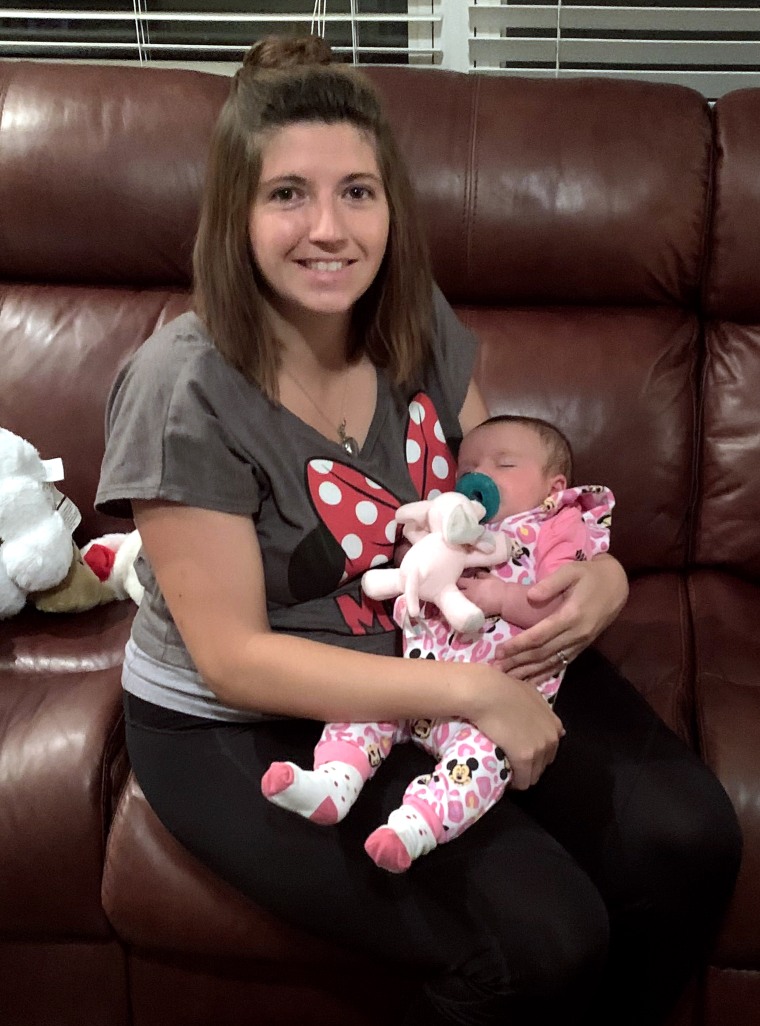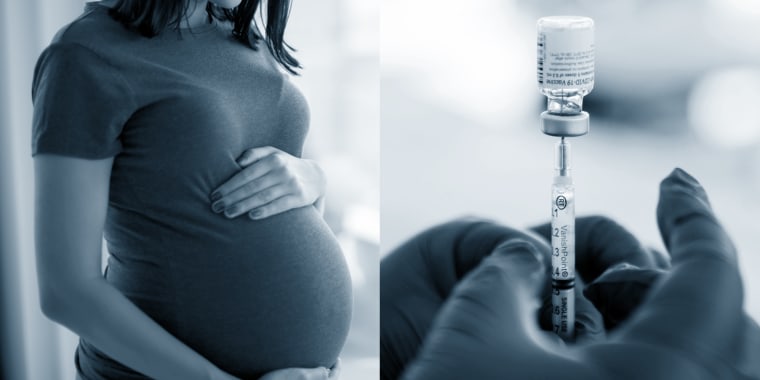Ashley Mink, a physician assistant in Dayton, Ohio, became eligible for her Covid-19 vaccination in December 2020. Pregnant with her third child at the time, she had kept a close eye on the vaccine trials and knew that pregnant women hadn’t been included in them — a concern she took to her obstetrician.
“You’re not supposed to eat turkey lunch meat,” Mink said of her feelings at the time, “but you’re recommending that I get a vaccine that hasn’t been studied yet.”
Over the course of her pregnancy, studies emerged showing no connection between the vaccines and problems in pregnancy and no association with birth defects. Mink’s OB recommended she get vaccinated, which Mink had initially planned to do once she was out of her first trimester, when the risk of miscarriage falls dramatically for all pregnancies.
But even after her OB’s suggestion, Mink still didn’t get the shot.
“I was so nervous,” Mink said. “I just didn’t want anything to happen with my pregnancy.”

Covid-19 poses an increased risk of severe illness (meaning hospitalization or need for a ventilator) to expectant mothers, and it can also cause complications like preterm delivery or stillbirth. Even so, only 67 percent of pregnant women are estimated to be fully vaccinated, according to the Centers for Disease Control and Prevention’s VaxView, a nationally representative survey of vaccination trends. In comparison, 94.4 percent of elderly people are fully vaccinated, as are 86.9 percent of people who have health conditions that put them at higher risk from Covid-19. Why then, are the rates for pregnant women lagging?
At a time when vaccine skepticism is at an all-time high and medical misinformation is running rampant, the precautions that public health officials have long urged pregnant women to take are working against them when it comes to Covid-19 shots.
Despite studies showing the vaccines to be safe for pregnant women — and a full-throated CDC endorsement of vaccination during pregnancy in August — a Kaiser Family Foundation poll published in November found that 39 percent of all adults believed pregnant women shouldn’t get the shots or weren’t sure they should.
Mink ultimately got vaccinated shortly after she delivered her daughter. While her experience was particular to that part of the pandemic — pregnant women now have official recommendations to turn to — her decision reflected common attitudes about pregnancy.
Vaccination during pregnancy wasn’t an easy sell before Covid-19. The CDC has recommended inoculation against influenza and whooping cough for years, but only 40 percent of pregnant women received both of those vaccines in the 2019-20 flu season. Measured against those numbers, it’s a success that 67 percent of pregnant women are vaccinated against Covid-19.
Pregnancy is often talked about as a “moment of purity” when people aren’t supposed to put things in their bodies, said Dr. Joia Crear-Perry, an OB-GYN and the president and founder of the National Birth Equity Collaborative, an advocacy group that works to improve birth outcomes for Black people. (The Covid vaccines aren’t the first to be recommended during pregnancy — the CDC also recommends whooping cough and flu vaccines.)
“So think about that when we’re now telling people to take a vaccine,” she said. “We are countering the message we’ve been giving them for generations.”
For decades, public health experts and health care providers have explicitly encouraged pregnant people to restrict what they eat and drink (tuna and coffee, for example) to avoid small increases in miscarriage risk or potential harms to their fetuses. In rare cases, women have been held responsible, sometimes legally and criminally, for bad pregnancy outcomes, including miscarriages or stillbirth.
And it’s in this environment that misinformation can worsen confusion and fuel hesitancy, said Jennifer Reich, a professor of sociology at the University of Colorado Denver, who has written about vaccination decisions.
“The fact that pregnant people are hesitant to use vaccines of any kind during pregnancy seems unsurprising to me,” Reich said.
Misinformation and general risk aversion can affect health care providers’ willingness to recommend vaccines, in addition to patients’ willingness to take them, Crear-Perry said. While there were early unknowns, there’s now very strong evidence that Covid-19 vaccines are safe during pregnancy.
Having providers recommend — or better yet, offer — vaccinations during pregnancy is one of the strongest predictors of vaccination uptake, according to the CDC.
“I do think there’s a role for providers’ being even more strong advocates for vaccination,” said Dr. Denise Jamieson, the chair of the department of gynecology and obstetrics at Emory University.
Crear-Perry said that while mindset issues are one barrier to vaccination in pregnancy, access problems are another. She noted that the coronavirus pandemic has also changed prenatal care, sometimes, in ways that complicate vaccination access. Prenatal visits that were customarily in person were often telehealth visits, a hardship for people without reliable internet service. Office visits are also vaccination opportunities — many clinics can administer all the routine vaccinations of pregnancy, including those for Covid-19, Jamieson said.
Black and Hispanic women, who already had lower rates of quality prenatal care than white and Asian women, are vaccinated against Covid-19 much less often than their pregnant peers, according to CDC data.
The national Covid-19 vaccination rate of 67 percent for pregnant women breaks down as 64 percent of white women, 63 percent of Hispanic women and 50 percent of Black women. A remarkable 86 percent of Asian pregnant women are fully vaccinated against Covid-19.
Vaccination rates during pregnancy for influenza and Tdap follow similar trends. While 40 percent of pregnant women overall received both the influenza and Tdap shots, Hispanic and Black pregnant women received both inoculations only 25.4 percent and 23 percent of the time, respectively. In contrast, 46 percent of white and 51 percent of “other, non-Hispanic” pregnant women received both vaccines.
Often, vaccination during pregnancy is an easier sell when it prioritizes the health of the infant after birth. Tdap, recommended during each pregnancy, is primarily aimed at creating immunity to pertussis, or whooping cough, in infants too young to be vaccinated. Influenza vaccination also creates some immunity in infants, Jamieson said. New research from the CDC indicates that the Covid-19 vaccines also protect infants after birth. Having that evidence to share with pregnant patients is likely to help boost adoption of the vaccines, Jamieson said.
Crear-Perry said she hopes misinformation can be defanged by more transparency with pregnant people about vaccines’ side effects and benefits, although she acknowledges that for some people that still won’t be enough. She’d also like to see a greater overall willingness to evaluate risks in pregnancy.
“We have — as a country — to believe that it’s OK,” she said, “that we can take things into our body when we’re pregnant.”
